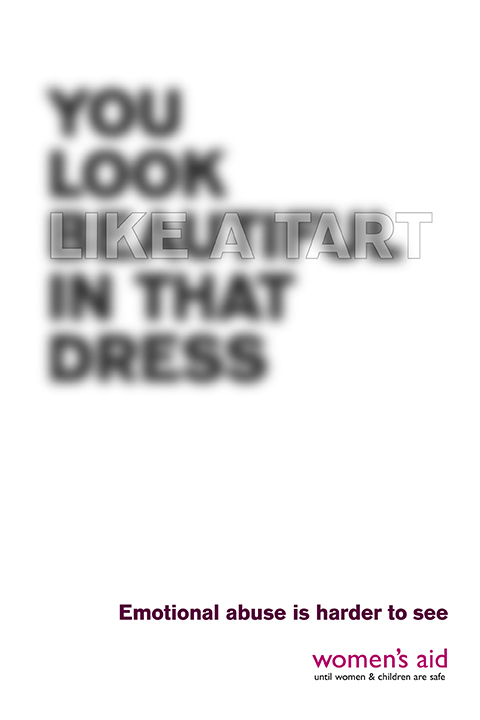
In 2015, Women's Aid released "Look at Me," a digital billboard where the bruises on a woman's face faded when more bystanders looked at her. Created by WCRS, it was a powerful way to remind us of the red flags in plain sight that often slip past our attention.
But domestic violence doesn't always leave bruises you can see. It's often more insidious—manifesting itself in a person who progressively takes control of your bank account and monitors your phone or even the food you eat or the amount you exercise.
These patterns of controlling behavior, which slowly pare away at a person's sense of autonomy and self, are called "coercive control." But this is a pretty abstract idea for people who don't have direct experience with it, or aren't sure how to recognize it. How do you convey damage happening on the inside?
For the holiday season, when domestic violence spikes, and to honor the first anniversary of legislation criminalizing coercive control in the U.K., Women's Aid and WCRS released a new set of digital out-of-home ads.
Conceptually, they're subtler than "Look at Me," and focused on the less visible ways a person can hurt you.
Ad seen from a distance:

Ad seen close up:

"Coercive control is the heart of domestic abuse. Physical violence often comes at a later point in an abusive relationship; what comes first is the systematic destruction of a survivor's self-esteem and autonomy, piece by piece," says Women's Aid CEO Polly Neate.
The ads use the displacement effect, a technique where you see different copy depending on the angle or distance at which you're viewing them—kind of like the hologram stickers you used to get in cereal boxes, except you really don't want to get these ones. Above, the words "I love you no matter what" transform into "You are mine no matter what."
It's often said that much of our communication is nonverbal. Depending on the context, most of it lies in body language and tone of voice, with only a small percentage being the actual words we say. The creepy thing about coercive control is that it can look and sound an awful lot like love to people outside the relationship—and worse still, even to the person it's happening to.
When a threat is made between the lines, meaning can be hard to prove, which puts victims in an especially fraught position—they aren't just gaslit by others, they probably also wonder for years whether they're crazy themselves.
This point is nicely illustrated below, where "You have no idea how great you are" becomes "I'll make you question who you are":


The campaign will run in London, Birmingham, Leeds and Edinburgh, with ad space donated by 8 Outdoor. It will appear on roadside sites with long dwell time and viewability, making it easy for drivers and other road users to absorb both messages as they approach.
"The opportunity WCRS has always sought with Women's Aid is to marry messaging with an element of the interactive," says Ross Neil, executive creative director of WCRS. "Interactivity on a media site that consumers speed past in seconds is therefore slightly limiting. Limiting can also be a challenge to creativity; that is why we are so proud of this piece of work. It uses the displacement illusion to deliver hidden messages to consumers, depending on their distance to the media site. Super simple, super effective."
Below, "You must know that I love you" becomes "No one will ever love you."


"Women's Aid campaigned to have coercive control recognized in law, and we are thrilled to have the support of 8 Outdoor and WCRS in communicating what coercive control is to the world in such a cutting-edge way," Neate says. "If we do not understand the nature of domestic abuse, we cannot reduce or prevent it—but this powerful campaign will go a long way to helping many more people understand the reality."
Next, "You look great wearing that to the party" becomes "You are not wearing that to the party."


This last ad plays on feelings of shame: "You look beautiful in that dress" subtly becomes "You look like a tart in that dress."


Each ends with a simple tagline: "Emotional abuse is harder to see." Between the lines, we'd add, "That doesn't make it less harmful."
The campaign kicked off Dec. 19, and will run for two weeks.
CREDITS
Client: Polly Neate, Teresa Parker / Women's Aid
Agency: WCRS
Executive Creative Director: Ross Neil
Head of Art: Lance Crozier
Creatives: Matthew Kennedy & Georgia Horrocks
Agency Producer: Anna Stina Lippert-Larsen
Account Handling: Torie Wilkinson, Lucy Nebel, Katherine Morris
Planning: Stuart Williams
Agency Designers: Jacinto Caetano - Lead Designer, Craig Townsend - Designer
Director of Technology: Dino Burbidge